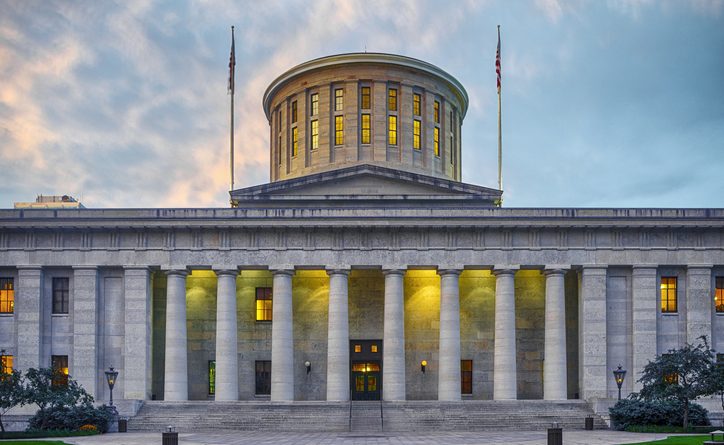Government Relations update
Here are the bills and other measures we’re following as 2024 winds down
By Michael Pramik, Ohio Public Employees Retirement System
Dec. 12, 2024 – In March, OPERS posted a blog detailing a series of pending bills and other political measures that could impact our members and retirees. Here’s an update where some of these bills – and others – stand as we approach the end of the year.
- House Bill 94 would address how service credit is transferred between OPERS and the Ohio Police & Fire Pension Fund. OPERS opposes the bill as drafted, and has proposed that eliminating an active-duty requirement to retire under OP&F would be a better solution. The bill currently is pending in the Ohio House Pensions Committee, and its passage is not anticipated by the end of the current legislative session this year.
- House Bill 257 would grant the OPERS trustees the authority to adopt a restrictive policy that would allow certain members of the board to participate in board meetings from a remote location. The bill has passed the House and is pending in the Senate Government Oversight Committee and currently is under negotiation with a possibility of passage this year.
- House Bill 261 would add emergency medical services workers to the OPERS Public Safety Division. OPERS has testified on the bill, requesting that the issue of law enforcement inclusions be addressed comprehensively. A similar measure, House Bill 441, would add parole officers to the OPERS Law Enforcement division and allow current members to buy into that division. Both bills are pending in separate committees.
- House Bill 296 passed last week out of the House Pensions Committee. The bill would increase the police employer contribution rate at the Ohio Police & Fire Pension Fund to 24% over six years. It does not include OPERS, but OPERS has sought to amend the bill to increase the statutory maximum contribution for OPERS Law Enforcement employers and grant the OPERS Board authority to raise that contribution rate to be equal to the police rate under OP&F. The bill, which has an estimated cost to employers of $81 million, is currently in the Senate but has had no hearings. If it is not passed by the end of the year, it would have to be reintroduced in 2025.
- House Bill 492, also pending in the House Pensions Committee, would require OPERS to create a deferred retirement option plan, or DROP, for law enforcement members. OPERS opposes the bill because we currently have a similar program that fulfills the goals of the DROP.
- Senate Bill 6 would prohibit OPERS from investing for the primary purpose of influencing any social, environmental or governance policy. OPERS has provided interested-party testimony, pointing out that the bill restates the currently adhered-to fiduciary duty standard. The bill has passed both chambers and was sent to Gov. Mike DeWine this week.
On the federal level, the most-visible current issue is the fate of the Social Security Fairness Act. On Nov. 12, the U.S. House voted overwhelmingly in favor of the bill, which would repeal the Windfall Elimination Provision and the Government Pension Offset. Those two rules reduce the Social Security benefit of many OPERS retirees.
The measure would require passage in the Senate and a signature from the president to take effect. As of mid-December, its future was still uncertain. Time is running out, as Congress is scheduled to end its session next week. However, Senate Majority Leader Chuck Schumer was quoted Wednesday at a rally for the bill on Capitol Hill that he would try to pass the legislation. On Thursday, Schumer filed cloture on a motion to proceed, which sets up a first vote on the bill.
OPERS staff continues to monitor a variety of other federal issues, including laws, regulations and active litigation, to determine their potential impact on our members. For instance, staff will be closely following the upcoming effort to extend provisions of the Tax Cuts and Jobs Act of 2017, as well as the debate over whether to extend the expanded tax credits currently available to individuals who are purchasing health insurance through an Affordable Care Act marketplace. Those provisions are set to expire at the end of 2025.
These measures bear watching because three of the four highest tax expenditures currently in place pertain either to retirement security or to employer-sponsored health care and thus could impact OPERS members.
Michael Pramik
Michael Pramik is communication strategist for the Ohio Public Employees Retirement System and editor of the PERSpective blog. As an experienced business journalist, he clarifies complex pension policies and helps members make smart choices to secure their retirement.

I retired from public service and received my opers retirement. I also receive my late husbands opers I receive his Medicare insurance however they said I couldn’t get a monetary amount because I made too much. Would I now receive his social security check without a spin down?
Does Biden plan to sign the Social security fairness Bill
Today, January 5, at 4PM
Think about How H.R. 82 Affects IRMAA:
Repealing H.R. 82 would not directly trigger IRMAA payments, but a higher Social Security benefit (if the bill passes and WEP/GPO are repealed) could potentially push you into an income bracket where IRMAA applies.